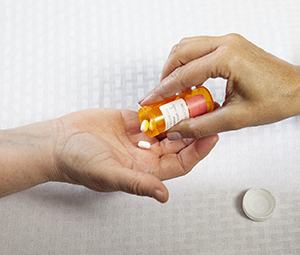Hospice: The Importance of Managing Pain
Pain management is the careful use of treatments to reduce suffering. Every person has a right to have relief from pain. The main goal of pain management in hospice is to improve quality of life. Pain management can also help improve a person’s physical and mental functions. You may have concerns about the use of pain medicine for you or your loved one. This sheet can help address these concerns. Discuss any questions you have with the hospice team.
 |
| Pain is best managed when medicine is given regularly and on a schedule. |
Common pain relievers
Opioids are medicines used in hospice to control pain. These include morphine, oxycodone, fentanyl, hydromorphone, levorphanol, and methadone.
Why pain management is important
Managing pain is key to improving quality of life. Pain keeps people from doing things they enjoy. It can prevent them from talking and spending time with others. It can affect their mood and their ability to think. And pain can make it hard to eat and sleep, which can make other symptoms worse. Pain causes distress and suffering for people and their loved ones. Pain can also increase blood pressure and heart rate, and can negatively affect healing. Managing the pain helps ease suffering.
How pain is managed
Pain management is mostly done with medicine. Pain medicine works best when it's used regularly and on a schedule. It shouldn't be held back until the pain gets bad.
The plan for pain care may include more than 1 type of pain medicine. Different types may be given over time to see which work best. They can be given in many ways. These include an IV (intravenous) drip, pill, oral liquid, or patch. The doses may be changed to ensure the most effectiveness. The body can get used to a medicine so more of it is needed over time. This is called tolerance. It's a normal part of hospice pain care. It may not be possible to ease all pain. But medicine can often provide a high level of relief.
Addressing concerns about pain medicine
The use of pain medicine may raise questions for you. The news contains stories of people addicted to pain medicine. Addiction is when a medicine is used after it's no longer needed. This isn't an issue for someone in hospice. Pain medicine will likely be needed until the end of life. You may also worry that pain medicine will shorten life. This is not often the case. Or you may worry that pain medicine may make a person too sleepy to talk. Great care will be taken to treat pain but keep the person alert enough to talk with family. In hospice, pain management is done carefully to prevent problems.
Managing side effects
The healthcare provider will explain the medicine's possible side effects. These may include constipation, itching, upset stomach (nausea), vomiting, extreme tiredness (fatigue), or mental fuzziness. Most of these go away after a short time. These symptoms will be treated.
Other ways to treat pain
There are other ways to help ease pain. These can be used along with pain medicine. Ask the hospice team about:
The patient’s role
You play a vital role in managing your pain. This includes:
-
Telling the hospice team when you're in pain. Being clear about your pain makes it easier for the team to treat it.
-
Telling the hospice team about any side effects you have.
-
Keeping a pain log. Write down when you feel pain and how strong it is. And write down what medicines you took. This helps the hospice team adjust the medicine as needed.
-
Taking the medicine as directed. Pain is harder to control if you wait too long to take the medicine. And you may end up needing a higher dose.
The family’s role
It may be hard for you to understand how your loved one feels. But the pain they have is real. And you can help. Assist your loved one with tracking the pain in a pain log. Make sure medicine is given on time. Don't save pain medicine or wait to give it to your loved one. This can cause them more pain and withdrawal symptoms. Pain relief is most effective when medicine is taken on schedule and before the pain gets bad. Remember that in hospice, good pain care is vital. It lets your loved one have the best quality of life during the time they have remaining.